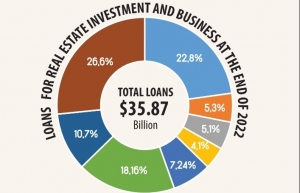Real estate bailout eyes credit recovery
The State Bank of Vietnam (SBV) issued the package for construction companies and homebuyers last week. According to Governor Nguyen Thi Hong, the SBV has engaged with four commercial banks and approved loan interest rates that are 1.5-2 per cent lower than the median lending rate of other banks.
 |
| Real estate bailout eyes credit recovery |
“The amount of the assistance package may exceed $5 billion if other institutions participate,” Hong said. “During the implementation, the SBV is prepared to refinance if participating banks have liquidity problems.”
According to the governor, Vietnam’s real estate industry requires a special loan package for the housing sector that helps address the market mismatch. Yet, she is still worried that the money supply in the long term “may decrease the flexibility of operational monetary policy,” going so far as to add that where the equity derives from is also a factor.
In the future, in addition to continuing to issue credit for the housing sector, the SBV will manage the credit risk for luxury real estate with no genuine demand, as well as speculation and market manipulation. She also said that recent real estate credit pressure was not significant due to credit management, but due to challenges in the corporate bond market.
This action demonstrates the banks’ attempts to loosen limitations on home lending activity. Notwithstanding the steps and assistance packages implemented, many economists anticipate that not all real estate enterprises will survive the crisis.
Assoc. Prof. Pham The Anh of the National Economics University said the pressure on the SBV can be seen. While the size was relatively small, barely 1 per cent of total current credit, the SBV was not resistant to concerns due to the money created by long-term refinancing.
“This implies that commercial banks participating in this assistance scheme may mortgage their current credit contracts for the long term to acquire money from the SBV for loans,” Anh said.
According to the expert, this kind of refinancing is often only carried out on a short-term basis when a bank slips into an illiquid situation or the interbank market freezes owing to a confidence crisis, as occurred last year.
Furthermore, preferential policies aimed at a specific group “fritter away resources to monitor and, inevitably, the parties’ methods to violate the law,” according to Anh, who supports measures that may decrease the overall interest rate ratio of the whole economy, as opposed to concentrating on a particular market.
In recent months, the Vietnamese government has attempted to alter the financial standing of real estate businesses, which is one of the primary causes of the market’s present crisis.
Commercial banks are also contemplating cutting loan and prepayment rates for homeowners. In January, the lending rates on housing loans varied between 5 per cent and 13 per cent annually, depending on the bank. Hong Leong Bank (13 per cent), Shinhan Bank (10.9 per cent, and UOB (10.9 per cent) belong to the group of banks with high annual interest rates for house loans.
Meanwhile, PVComBank and TPBank offer home lending rates ranging 5-6 per cent per year. Nevertheless, this rate is only applicable for the first 3-6 months of the loan. Following the preferential term, the bank will periodically adjust the interest rate per current legislation.
However, since the second quarter of 2022, the effects of the economic slowdown, clogged capital flows, and redundancies in investment processes have had a significant impact on and changed the nature of Vietnam’s real estate market.
The situation has worsened this year. In 2022, the whole market absorption rate touched around 39 per cent, or 19,000 transactions, which was just 17 per cent of 2018’s transaction volume. According to the Vietnam National Real Estate Association (VNREA), the number of real estate companies that filed for bankruptcy and dissolved last year jumped by 38.7 per cent compared to the same time in the previous year, totalling around 1,200.
The VNREA announced last week that hundreds of real estate projects had been halted, with an estimated investment worth $33.7 billion, and that almost 80 per cent of broker personnel were forced out of their jobs.
Local authorities are now seeking methods to rectify the housing market. Vice Chairman of Hanoi People’s Committee Duong Duc Tuan said, “The restrictive credit policy and increasing raw material costs have driven up real estate prices by more than 10 per cent.”
According to the VNREA, the supply of real estate in the Vietnamese market plummeted to a historic low of about 7,000 units at the end of last year. The housing market remains dismal and, this year, Tuan said the supply of apartments on the market “may decrease by up to 25 per cent.”
Tuan said the majority of items provided on the market are in the middle- and upper-tier price ranges and located mostly in major cities, and there are few budget housing and social housing developments.
Legal issues have contributed to the limited supply, which consisted mostly of already-authorised projects from last year. Tuan expects the government to establish a new decree to link the land, investment, and housing laws to clarify auction and bidding procedures as soon as possible.
| The Vietnamese government has made efforts to progressively restore the viability and sustained development of the real estate sector. In December, the SBV agreed to increase the credit room by 1.5-2 per cent, or about $10.1 billion. When combined with the $8.4 billion of the remaining 14 per cent credit room, the total credit capital available to stream into the economy in December was around $18.5 billion. The PM also approved three dispatches on supplying credit capital for the economy, the corporate bond market, and on clearing hurdles for the real estate market. The previous month, the prime minister launched a team to guide the elimination of issues of real estate projects for both localities and businesses. |
 | Real estate bailout “perilous” for system As more than $52 billion is due to banks and bondholders from real estate corporations, not to mention the requirement for additional loans, experts say a purge in the real estate market is unavoidable. |
What the stars mean:
★ Poor ★ ★ Promising ★★★ Good ★★★★ Very good ★★★★★ Exceptional
Related Contents
Latest News
More News
- Banking sector targets double-digit growth (February 23, 2026 | 09:00)
- Private capital funds as cornerstone of IFC plans (February 20, 2026 | 14:38)
- Priorities for building credibility and momentum within Vietnamese IFCs (February 20, 2026 | 14:29)
- How Hong Kong can bridge critical financial centre gaps (February 20, 2026 | 14:22)
- All global experiences useful for Vietnam’s international financial hub (February 20, 2026 | 14:16)
- Raised ties reaffirm strategic trust (February 20, 2026 | 14:06)
- Sustained growth can translate into income gains (February 19, 2026 | 18:55)
- The vision to maintain a stable monetary policy (February 19, 2026 | 08:50)
- Banking sector faces data governance hurdles in AI transition (February 19, 2026 | 08:00)
- AI leading to shift in banking roles (February 18, 2026 | 19:54)

 Tag:
Tag:




















 Mobile Version
Mobile Version